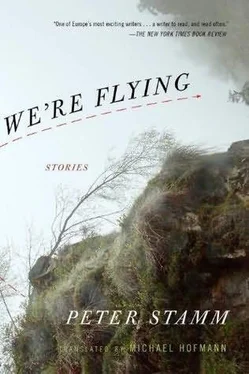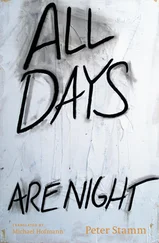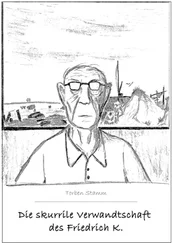Through the trees Michael could see only a few scattered stars. But when he left their cover and stepped out onto the field, he saw all the stars that can be seen on a cold night, and for the first time since he had come here, he was not afraid of this sky. And he was glad that the sky was so distant, and that he himself was so small on this endless field. So distant that even God had to take a second look to see him.
Soon he was back in the village. The dogs barked, and Michael threw stones at the gates and barked himself, and aped the dogs, their stupid yapping and howling, and he laughed when the dogs were beside themselves with rage and fury: and he was beside himself just as much.
In the vicarage the lights were on, and as soon as Michael stepped inside, he could smell the dinner that Mandy had cooked. And as he took off his sodden boots and his heavy coat, she stepped out into the kitchen doorway and looked anxiously at him. It had gotten cold, he said, and she said dinner was ready. Then Michael stepped up to Mandy, and he kissed her on the mouth, as she smiled up at him. Over supper they discussed one possible name for the baby, and then another one. And when it was bedtime they squeezed each other’s hands, and each went to their own room.
As it got colder and colder in January, and it was almost impossible to heat the old vicarage, Mandy moved one evening from the guest bedroom into the warmer room of the master of the house. She carried her blanket in front of her, and lay down beside Michael as he moved aside, without a word. And that night, and in all the nights to come, they lay in one bed, and so learned to know and to love one another better. And Michael saw everything, and Mandy was not ashamed.
But was it a sin? Who could know. And hadn’t Mandy’s own blood affirmed that it was a child of God that was growing, a child of purity? Could there be anything impure about purity?
Even if Michael hadn’t thought it possible, his word reached the people and the Communists of the village. They were touched by the wonder that had occurred, and one couldn’t say how: for such people came to the door and knocked. They came without many words, and brought what they had. A neighbor brought a cake. She had been baking, she said, and it was no more trouble to bake two than one. And was Mandy doing all right?
On another day, Marco the publican came around and asked how far along they were. Michael invited him in, and called Mandy, and made tea in the kitchen. Then the three of them sat at the table and were silent, because they didn’t know what to say. Marco had brought along a bottle of cognac, and set it down in front of them. He knew full well, he said, that it wasn’t the right thing for a small baby, but maybe if it had a colic. Then he asked to have it explained to him, and when Michael did so, Marco looked at Mandy and her belly with disbelief. Was that certain? he asked, and Michael said no one knew, and no one could know. Because it was pretty unlikely, Marco said. He had picked up the cognac again, and was looking at the bottle. He seemed to hesitate, but then he put it back on the table, and said, three stars, that’s the best you can get hereabouts. Not the one I serve my customers. And he was a little confused, and he stood up and scratched his head. Back in the summer you rode pillion on my bike, he said, and he laughed, think of it. They’d gone bathing, the whole lot of them, in the lake outside F. Who’d have thought it.
When Marco left, Frau Schmidt was standing in the garden, with something she had knitted for the baby. With her was Nurse Ulla from the retirement home, whom Michael had suspected of being a Communist. But she was bringing something herself, a soft toy, and she wanted Mandy to touch her as well.
It was one after another. The table in the front room was covered with presents, and the cupboard housed a dozen or more bottles of schnapps. The children brought drawings of Mandy and the baby, and sometimes Michael was in the pictures too, and perhaps an ass or an ox as well.
Before long the people were coming from W. and the other villages, wanting to see the expectant mother, to ask her advice on this or that matter. And Mandy gave them advice and comfort, and sometimes she would lay her hand on the arm or the head of the people, without saying anything. She had become so earnest and still that even Michael seemed to see her anew. And did all that needed to be done. In the village, various quarrels were settled during these days, and even the dogs seemed to be less ferocious when Michael walked down the street, and on some houses the straw stars and Christmas wreaths were back up on the doors again, and in the windows, because the whole village was rejoicing, as though Christmas was yet to come. Everyone knew it, but no one said it.
One time, Dr. Klaus came to see that all was well. But when he knocked on the door, Michael did not welcome him in. He sat upstairs with Mandy, and they were quiet as two children, and peeked out of the window until they saw the doctor leaving.
The next day, Michael went to W. to see the doctor. He poured schnapps, and asked how things stood with Mandy. Michael didn’t touch the schnapps. He merely said everything was fine, and they didn’t need a doctor. And these stories that were making the rounds? He that is of the earth is earthly, and speaketh of the earth, said Michael. Be that as it may, said the doctor, the baby will be born on earth, and not in heaven. And if you need help, then call me, and I’ll come. Then they shook hands, and nothing more was said. Michael, though, went back to the retirement home in the village and spoke to Nurse Ulla. She had four children herself, and knew the ropes. And she promised him she would assist when the time came.
Then in February, the time came: the baby was born. Mandy was assisted by Michael, and by Nurse Ulla, whom he had called in. As word spread of the impending event, people gathered on the village streets to wait in silence. It was already dark when the baby was born, and Ulla stepped up to the window and held it aloft, that all might see it. And it was a girl.
Michael sat at Mandy’s bedside, holding her hand and looking at the baby. She’s no beauty, said Mandy, but that was more of a question. And Nurse Ulla asked the new mother where she meant to go with her baby, as she would no longer be able to run the minister’s household anymore. Then Michael said: He that hath the bride is the bridegroom. And he kissed Mandy in full view of the nurse. And she later told everyone of it: that he had given his word.
Because the child could not be called Jesus, they called it Sandra. And as the people in the village believed it had been born for them, they didn’t mind that it was a girl. And all were contented and rejoiced.
The following Sunday attendance at church was greater than it had been for a long time. Mandy and the babe sat in the front pew. The organ was playing, and after it had played, Michael climbed up to the pulpit and spoke as follows: Whether this is a child that has long been awaited in the world, we do not know, and may not know. For you yourselves know perfectly that the day of the Lord so cometh as a thief in the night. But ye, brethren, are not in darkness. For they that sleep sleep in the night; and they that be drunken are drunken in the night. But let us, who are of the day, be sober.
That which is born of the flesh is flesh, said Michael, and that which is born of the Spirit is spirit. But we, beloved, should be called the children of God.
BACK THEN, THE time you left Trouville and climbed the narrow path up the hill, and then crossed the harvested field to get a good view. The earth clung to your soles in thick clumps, the leather was sodden. There was this kid, a boy, ten years old or even younger. He watched as you crossed the field, set up your folding chair, and started sketching the landscape. First he watched you from a distance, then he slowly came closer, step by step, wary as a cat. His clothes were old and dirty, their color like the earth from which he emerged. His hair was slightly reddish, almost transparent when the sun struck it in the odd moments when it broke through the clouds. His nose was blocked and he sniffled persistently. He kept his mouth slightly open to breathe, which distorted his otherwise pretty face, and gave it an expression of stupidity.
Читать дальше







![Brian Jacques - [Flying Dutchman 01] - Castaways of the Flying Dutchman](/books/128851/brian-jacques-flying-dutchman-01-thumb.webp)




